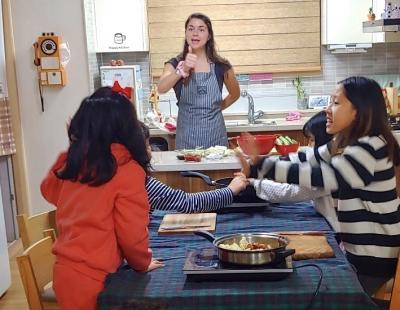Coronavirus brings Marion Fulbright fellow home
MARION — The first casualty of coronavirus on the South Coast may have been Marion Fulbright fellow Julia O’Rourke’s yearlong fellowship in South Korea.
Fulbright fellow Julia O’Rourke is home from South Korea, but she didn’t get much of a homecoming, as she had to immediately go into self-quarantine because her fellowship was cut short by the spread of coronavirus there.
The first casualty of coronavirus on the South Coast may have been Marion Fulbright fellow Julia O’Rourke’s yearlong fellowship in South Korea.
She still has not seen her grandfather, to avoid potentially passing the virus on to him.
The Marion native and Tabor Academy graduate had planned a yearlong stay from July 2019 to July 2020, but it was cut to just seven months.
Though it didn’t force her to leave until March 4, the virus “really just impacted me right away,” in mid-January when she was in Australia with her parents and planned to go to China. The disease was spreading there, forcing them to cancel that leg of the trip.
She was quarantined when she returned to South Korea, making this her second medical seclusion.
O’Rourke said that she was surprised to find that she didn’t want to watch a lot of TV while housebound. Instead, she read a lot of books, taught herself to French braid hair, called people to catch up and completed cryptograms.
Luckily, she said that “Korea’s response to everything is so speedy,” and that “Fulbright reacted so quickly,” as well.
O’Rourke said the area where she was living, Mokpo, is fine and that there were, “not that many cases” there, but it varied heavily from region to region.
She said that because South Korea offered the testing for the virus for free, it had more data, which led to higher and more accurate numbers for the disease.
However, the country cancelled school for a week, which is major for South Korea, since education is so valued there that they stop public transport during the listening portion of the SAT tests.
It was certainly an eye-opening experience to be on the ground as the disease spread, as O’Rourke had “never experienced anything like that.” She added that when she first heard of the disease she “never would have guessed it would have led to me coming home.”
She was drawn to the Fulbright experience for the cultural immersion that it offered and for the chance to teach. However with the country making moves to bring in more experienced teachers to make up for lost time, she realized that “it would be so long before I could teach or explore again,” that it wasn’t worth it she said.
Though O’Rourke said that she still got a lot out of the experience, even after seven months, she added that it “didn’t feel good to be able to leave,” since she was very close with her host family, coworkers and students who didn’t have that option.
There was also the sobering thought that some of her fellow Fulbrighters chose to stay because at 26 years old, they wouldn’t have health insurance in the United States if they returned.
“That’s why Fulbright made it optional,” O’Rourke said.
The program is still paying her a stipend, and if the timing works out, she could have the option to potentially return to South Korea.
The mechanics of getting back to the United States were fairly simple, as it only required a temperature check when O’Rourke boarded the plane. “No one asked me any questions about health,” she said, though she added that the response may have changed since then.
Though O’Rourke is sad to have a special experience cut short, she is “eager to work in admissions,” for a college as she feels it will help her find a focus for grad school. Coming back to something that excites her made the pain of leaving just a little easier.













